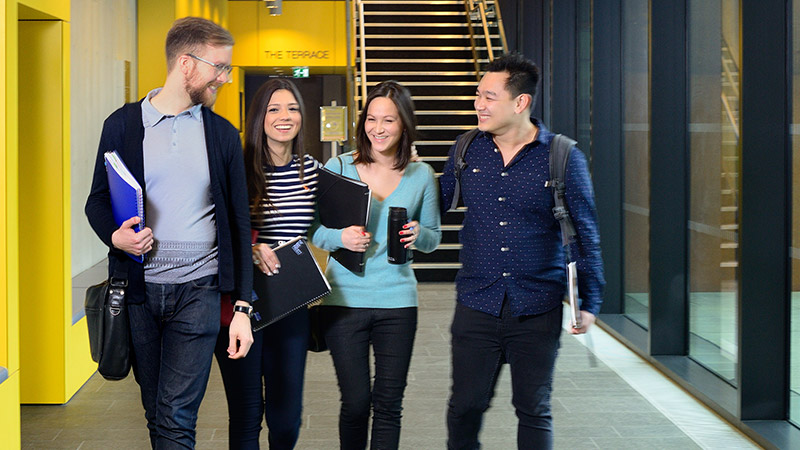Education
MA
UCAS code: P008109
Start dates: September 2026
Full time: One year - on campus or distance learning
Part time: Two years - on campus or distance learning
Location: Headington, Distance learning
Overview
Take your career to the next level with an MA in Education. In this course, you’ll develop advanced practitioner skills that you can apply across educational settings. You’ll also be free to explore your specific professional interests in depth by choosing to complete a named dissertation in your specialism.
You’ll enjoy a flexible learning environment, based around the school term, including:
- Saturday workshops during term time
- consideration for the work patterns in the education sector
- a range of digital resources and distance learning tools
- the ability to mix distance learning with in person classes.
You’ll join a vibrant learning community of experienced and passionate professionals. You'll discuss and share case studies and debate key topics in education with opportunities to network and learn from each other, while sharing your own expertise.
Throughout your studies you'll grow as a leader and expert practitioner and you'll finish the course ready to influence change or lead best practice in your workplace.
Why Oxford Brookes University?
-
Flexible learning
Our course supports you to develop your career whilst maintaining your existing commitments through a mix of in-person weekend lectures and online learning.
-
Follow your interests
Choose one of eight specialist areas in which to complete a named dissertation reflecting your professional interest.
-
Future proof your career
With a focus on areas like sustainability, inclusion, digital technologies and creative learning, our modules are designed to meet today’s challenges in Education.
-
Expand your network
Benefit from joining our community of experienced and passionate professionals to share your experience and debate key topics in education.
-
Enhance your skills
By the end of this course you'll grow as a leader and expert practitioner, ready to influence change and lead best practice in your workplace.
Course details
Study modules
Please note: As our courses are reviewed regularly as part of our quality assurance framework, the modules you can choose from may vary from those shown here. The structure of the course may also mean some modules are not available to you.
Research
The School of Education, Humanities and Languages is a thriving centre for educational research and teacher professional development. Students on master's level programmes therefore join a large research community comprising researchers at all levels of higher education study.
We hold two major research conferences each year - the School of Education Research Conference and the EdD Colloquium. All students are invited to attend our annual Research Seminar Series (which attracts both internal and external speakers). We also organise a number of conferences, lectures, seminars and debates, some of which have an international reach.
The School's six research groups exist to encourage engagement in research, publication, conference presentations, seminars and workshops:
- Inclusion and Wellbeing
- Policy, Partnership and Leadership
- STEAM pedagogy and learning
- Humanistic Perspectives on Education
- Early Years
- Applied Linguistics
View all staff profiles for School of Education, Humanities and Languages

Careers
Completion of the course shows commitment to professional development and should lead to improved prospects for career progression.
Student profiles
Related courses
Entry requirements
Specific entry requirements
This MA course attracts students from a wide range of backgrounds and nationalities, who are graduates with a recognised teaching qualification, or other relevant educational experience.
Applicants normally have:
- a good honours degree (second class honours degree (2:2) or above)
- other education based professional qualification or relevant experience.
Entry with credit
Credit can be made up of appropriate work completed outside the course, for example, M level credit from PGCE awards, Postgraduate Certificates or Postgraduate Diplomas in relevant educational courses.
Please also see the University's general entry requirements.
English language requirements
Candidates whose first language is not English should be able to demonstrate a satisfactory level of spoken and written English.
- IELTS level 6.5 or above with a minimum of 6.0 in reading and writing and 5.5 in speaking and listening.
Please also see the University's standard English language requirements.
Pathways courses for international and EU students
We offer a range of courses to help you meet the entry requirements for your postgraduate course and also familiarise you with university life in the UK.
Take a Pre-Master's course to develop your subject knowledge, study skills and academic language level in preparation for your master's course.
If you need to improve your English language, we offer pre-sessional English language courses to help you meet the English language requirements of your chosen master’s course.
English requirements for visas
If you need a student visa to enter the UK you will need to meet the UK Visas and Immigration minimum language requirements as well as the University's requirements. Find out more about English language requirements.
International applications
International students hold a conditional offer until payment of a deposit of £3,000 is received.
Terms and conditions of enrolment
When you accept our offer, you agree to the Terms and Conditions of Enrolment. You should therefore read those conditions before accepting the offer.
International qualifications and equivalences
How to apply
Application process
Tuition fees
Questions about fees?
Contact Student Finance on:
Tuition fees
The following factors will be taken into account by the University when it is setting the annual fees: inflationary measures such as the retail price indices, projected increases in University costs, changes in the level of funding received from Government sources, admissions statistics and access considerations including the availability of student support.
How and when to pay
Tuition fee instalments for the semester are due by the Monday of week 1 of each semester. Students are not liable for full fees for that semester if they leave before week 4. If the leaving date is after week 4, full fees for the semester are payable.
- For information on payment methods please see our Make a Payment page.
- For information about refunds please visit our Refund policy page
Additional costs
Please be aware that some courses will involve some additional costs that are not covered by your fees. Specific additional costs for this course are detailed below.
Optional costs
| Additional costs | Amount (£) |
|---|---|
It’s your responsibility to cover print / binding costs where coursework submission is required. Please note that a lot of the coursework is now submitted online. |
From £30 |
| You may choose to purchase books to support your studies. Many books on our reading lists are available via the Library, or can be purchased secondhand. | £20-60 per book |
Accommodation fees in Brookes Letting (most do not include bills) |
£107-301 per week |
Accommodation fees in university halls (bills included, excluding laundry costs) |
£139-248 per week |
Graduation costs include tickets, gowning and photography. Gowns are not compulsory but typically students do hire robes, starting at £41. |
Typically £0-200 |
Students are responsible for their own travel to and from university for classes. For the 2025/26 academic year, the University is introducing an alternative subsidised travel offer for all students with further information on our Travel webpages. |
From £10 |
Funding your studies
Financial support and scholarships
Featured funding opportunities available for this course.
All financial support and scholarships
Programme changes:
On rare occasions we may need to make changes to our course programmes after they have been
published on the website. For more information, please visit our
changes to programmes page.

